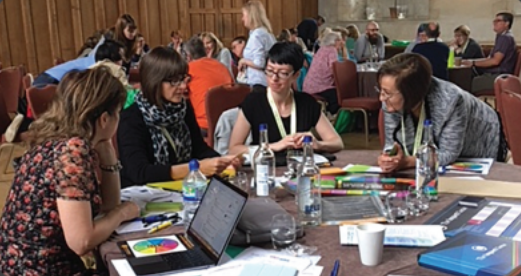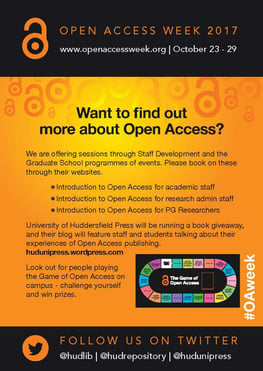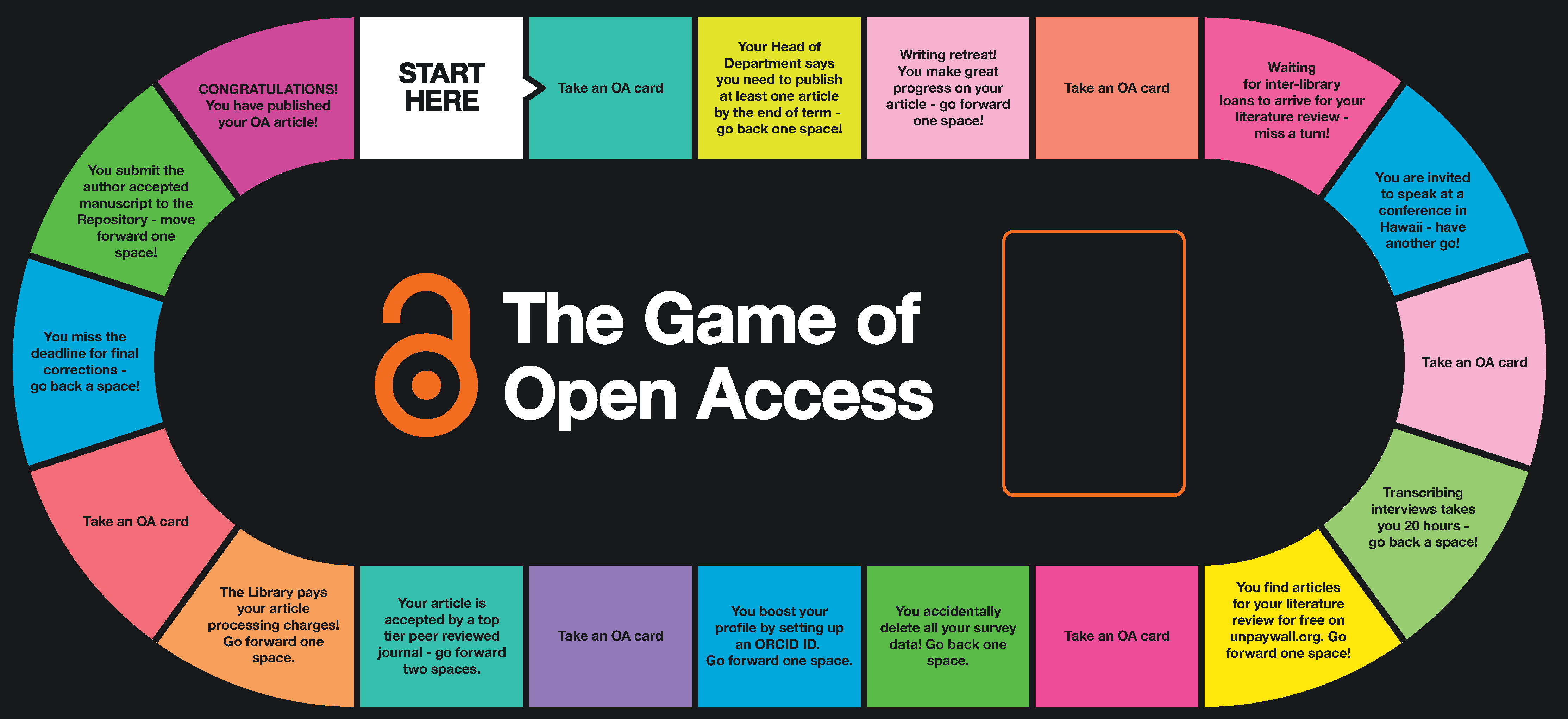Catherine Parker is the Collections & Scholarly Communications Librarian at the University of Huddersfield, England. She and her colleagues created a game-based resource to engage researchers with the key concepts and tools required to meet the U.K.'s open access mandates for publishing.
Tell us about the background of your institution.
The University of Huddersfield has a growing research community, in part due to an ambitious five-year strategy, which sets out the vision for the institution to be an inspiring, innovative university of international renown. The vice chancellor’s office not only expects teaching excellence from its staff for its 19,000 students, but it also wants to: increase the number of research-active staff; improve the quality of their outputs; see a rise in the quantity and quality of the postgraduate researcher community; and improve the quality and range of our external research, enterprise, and innovation income.
Can you talk about the open access momentum?
Open access publication is growing year on year and governmental mandates are increasingly important for assessments. Authors are increasingly having to consider compliance with funder and governmental requirements when they publish.
What gave you the impetus for the game?
 To support our researchers, library staff reached out to help them adapt to a challenging set of rules, mandates, policies and systems. However, once we started looking at the process a researcher needs to follow to publish something (according to the OA mandate for the REF) we realized how confusing and complex it was. In spring 2017, a few members of the subject team and the scholarly communications team brainstormed ideas for a board game that would contain 20 questions. Our in-house graphic designer created the visuals. We then tested the game and tweaked it until we were happy for its first official outing, at the annual Computing & Library Services Showcase in July 2017, and then again at Open Access Week in October.
To support our researchers, library staff reached out to help them adapt to a challenging set of rules, mandates, policies and systems. However, once we started looking at the process a researcher needs to follow to publish something (according to the OA mandate for the REF) we realized how confusing and complex it was. In spring 2017, a few members of the subject team and the scholarly communications team brainstormed ideas for a board game that would contain 20 questions. Our in-house graphic designer created the visuals. We then tested the game and tweaked it until we were happy for its first official outing, at the annual Computing & Library Services Showcase in July 2017, and then again at Open Access Week in October.
What exactly is the Game of Open Access?
Through playful learning, the game demonstrates the use of OA concepts, all the way through the initial idea for an article, to its acceptance for publication. Several librarians used game-based learning for their information skills sessions, so we decided to use this approach to engage our researchers.
We have a customer journey map with pain points for researchers, to highlight the issues. But we asked, did it need to be this complicated? How could we make it easier for them to navigate the maze of where to find help, or what is the difference between Gold and Green layers of OA, or who pays for Gold (the library or the faculty) and does each faculty have an OA policy? It was obvious that there were no clear guidelines on how to manage these OA processes and that research support staff were as confused as the researchers themselves!
What has the response been like?
The game enables library staff to help researchers deepen their understanding of OA compliance. Hopefully with the game, in addition to traditional support, library guides and advocacy, we can lighten the stresses of their journey towards publication. So far, the game has been played by researchers and librarians in the context of library roadshows, during Open Access Week, in OA information sessions, and more recently at the CILIP ARGL DARTS6 conference, where delegates played the game and gave honest and constructive feedback on how it could be improved. Feedback quotes include: “I loved this game!”; “Cards are really easy to read in a good font size and contrast (even without glasses! lol)”; “Really simple to play, almost no instruction needed.”
How did you promote it for greater user engagement?
 We began by developing some publicity to promote OA compliancy, and help with the plethora of definitions. We also developed a Libguide for OA support with help on terminology, processes and policies, and it became apparent that our focus needed to shift to engagement. And it seems we are in good company, as games seem to be a very popular way of disseminating information and encourage understanding, with the likes of The Publishing Trap by Secker & Morrison, and the Impact Game from Cranfield University gaining momentum in the field.
We began by developing some publicity to promote OA compliancy, and help with the plethora of definitions. We also developed a Libguide for OA support with help on terminology, processes and policies, and it became apparent that our focus needed to shift to engagement. And it seems we are in good company, as games seem to be a very popular way of disseminating information and encourage understanding, with the likes of The Publishing Trap by Secker & Morrison, and the Impact Game from Cranfield University gaining momentum in the field.
What do you see for the future of the game?
Following the DARTS6 conference in May 2018, some delegates played the game with researchers at their institutions and received very positive feedback, and, most importantly, lots of discussions around OA mandates. Back at base, we can now take on board the feedback given and alter some questions, add more scenarios, and even adapt the game-play with the potential for some Wildcards. There could perhaps be a “special edition” version for UK REF 21, with an option for a potential online version, too.


